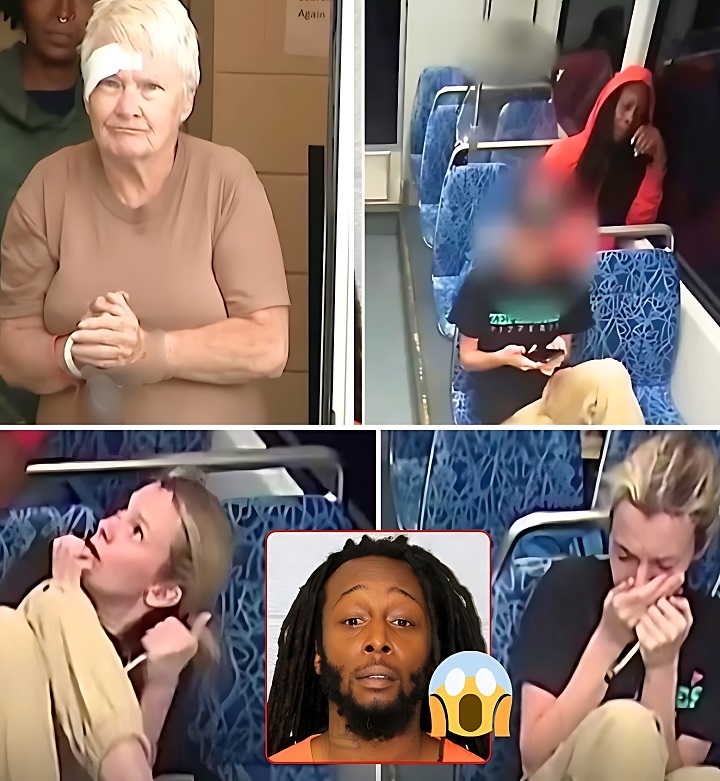On a quiet August evening in Charlotte, North Carolina, a tragedy unfolded that would shatter a family’s dreams and send shockwaves through a community. Iryna Zarutska, a 23-year-old Ukrainian refugee, was brutally stabbed to death on a Lynx Blue Line train, her life cut short in a random act of violence that has left her loved ones grappling with unimaginable grief. In their first public statement since the incident, Iryna’s family has spoken out, their words a heart-wrenching blend of sorrow, anger, and a resolute call for justice. Their plea not only mourns the loss of a vibrant young woman but also demands accountability and reform to prevent such senseless acts from claiming more lives.
A Life Stolen in an Instant
Iryna Zarutska’s story is one of resilience, hope, and a relentless pursuit of a better life. Fleeing the war-torn landscapes of Ukraine, she arrived in Charlotte seeking the peace and safety that had eluded her homeland. At just 23, she was building a new chapter, working full-time at a local pizzeria and enrolling in community college classes to improve her English. Her family describes her as a beacon of light—kind, determined, and full of dreams. “Iryna came here to find peace and safety,” her family said in their statement to PEOPLE, “and instead, her life was stolen from her in the most horrific way.”
On August 22, 2025, Iryna boarded the Lynx Blue Line, heading home after a long shift at work. It was a routine she had grown accustomed to, a small piece of her new life in America. But that evening, her journey was interrupted by Decarlos Brown Jr., a man with a documented history of mental illness and over a dozen prior arrests. In a chilling moment captured on surveillance footage, Brown attacked Iryna in a random act of violence, fatally stabbing her. The footage, described as gruesome by authorities, has since sparked outrage and sorrow, with many questioning how such a tragedy could occur on a public transit system meant to be safe for all.

A Family’s Heartbreak
The Zarutska family’s statement is a raw outpouring of grief, a testament to the depth of their loss. “We are heartbroken beyond words,” they wrote, their words echoing the pain of a family torn apart by an act of senseless violence. Iryna was more than a statistic or a headline; she was a daughter, a sister, a friend whose laughter filled rooms and whose determination inspired those around her. Her family paints a vivid picture of a young woman who, despite the horrors she had witnessed in Ukraine, carried an unshakable belief in the possibility of a brighter future.
For Iryna’s loved ones, the pain is compounded by the circumstances of her death. The randomness of the attack, the brutality captured on video, and the knowledge that the perpetrator was a known individual with a history of criminal behavior have left them grappling with questions that have no easy answers. “How could someone with such a record be free to roam the streets?” they ask, their frustration palpable. Their statement highlights a broader concern about public safety, pointing to systemic failures that allowed a dangerous individual to cross paths with an innocent young woman.
The family’s plea for privacy and respect is equally poignant. They have urged the public and media to refrain from sharing the graphic surveillance footage of Iryna’s final moments, emphasizing the need to preserve her dignity and their own grief. “Please respect Iryna’s dignity and our grief,” they implored, a request that underscores the added torment of seeing their loved one’s death reduced to a viral video. In an age where graphic content spreads rapidly online, their call serves as a reminder of the human cost behind such images—a cost borne by those left behind to mourn.
A Call for Justice and Reform
Beyond their grief, the Zarutska family’s statement is a powerful demand for change. They are calling for justice—not just for Iryna, but for all those who rely on public spaces to feel safe. Their demands are specific and unflinching: stronger security measures on Charlotte’s light rail system, greater accountability from the Charlotte Area Transit System (CATS) and its contractors, and a reevaluation of policies that allow individuals with extensive criminal histories to move freely in public spaces. “We cannot bring Iryna back,” they wrote, “but we can fight to ensure no other family endures this pain.”
The family’s call for reform has struck a chord with the Charlotte community and beyond. The Lynx Blue Line, a vital artery of the city’s public transit system, is meant to be a safe haven for commuters. Yet, Iryna’s death has exposed vulnerabilities that many residents now view with fear and skepticism. The fact that Decarlos Brown Jr. was out on cashless bail, despite a history of arrests, has fueled debates about the criminal justice system and its approach to repeat offenders, particularly those with mental health challenges. Former President Donald Trump weighed in on the case, condemning the “lenient bail laws” that allowed Brown to be free and calling for stricter measures to keep “criminals like this” off the streets.
The family’s demands go beyond punitive measures. They are advocating for systemic changes that prioritize prevention—more robust security protocols, better mental health interventions, and a transit system that invests in the safety of its passengers. Their statement is not just a cry for justice but a blueprint for a safer future, one where no one has to fear for their life while riding a train home from work.
A Community in Mourning
Iryna’s death has reverberated far beyond her family, touching the hearts of Charlotte’s residents and the broader Ukrainian diaspora. In the days following the tragedy, tributes poured in, with friends, coworkers, and strangers alike sharing stories of Iryna’s kindness and resilience. A GoFundMe page set up to support her family described her as a “beautiful soul” whose determination to build a new life inspired those around her. The page has raised thousands of dollars, a testament to the community’s desire to support her grieving loved ones.
Charlotte’s mayor, who recently secured a primary re-election victory, has faced intense scrutiny in the wake of Iryna’s death. The city’s leadership is under pressure to address the public safety concerns raised by her killing, with many residents calling for immediate action. The release of the surveillance footage, while intended to aid in transparency, has only amplified the public’s outrage, with some questioning why such a graphic video was made public at all. The family’s plea to respect Iryna’s dignity has added fuel to this debate, highlighting the delicate balance between transparency and compassion.
The tragedy has also sparked broader conversations about violence in public spaces and the role of mental health in criminal behavior. Decarlos Brown Jr.’s history of mental illness has raised questions about how society addresses individuals who pose a risk to others. While some advocate for stricter incarceration policies, others argue for more comprehensive mental health support to prevent such tragedies. Iryna’s family, while focused on their loss, has become an unwitting catalyst for these discussions, their pain shining a light on issues that affect countless communities.
A Life Remembered
At the heart of this tragedy is Iryna Zarutska herself—a young woman whose life was marked by courage and hope. Born in Ukraine, she grew up amidst the turmoil of war, yet she refused to let it define her. Her decision to come to the United States was driven by a desire for safety and opportunity, a dream shared by millions of refugees around the world. In Charlotte, she found a community that embraced her, a job that gave her purpose, and a future that seemed bright with possibility.
Her family’s statement paints a vivid picture of who Iryna was: a woman who loved to laugh, who worked tirelessly to improve her English, and who dreamed of one day reuniting with her family in a peaceful world. Her coworkers at the pizzeria where she worked described her as a “ray of sunshine,” always quick with a smile even after long hours on her feet. Her teachers at the community college spoke of her dedication, noting her eagerness to learn and her determination to succeed. To those who knew her, Iryna was not just a victim—she was a force of life, a testament to the resilience of the human spirit.
The pain of her loss is compounded by the fact that her father, still in Ukraine due to the ongoing war, was unable to travel to lay her to rest. “He had to stay back,” the family noted in their statement, a stark reminder of the broader context of their grief. For them, Iryna’s death is not just a personal tragedy but a cruel twist in a journey that was meant to lead to safety and freedom.
A Call to Action
As the Zarutska family navigates their grief, their statement serves as a rallying cry for change. They are not content to let Iryna’s death be just another headline; they want her legacy to be one of transformation. Their demands for stronger security, accountability, and systemic reform are a challenge to policymakers, transit authorities, and communities everywhere. They ask us to consider: What does it mean to feel safe? How do we protect the most vulnerable among us? And how do we honor the memory of those whose lives are taken too soon?
For those who read Iryna’s story, the call to action is clear. Support her family’s plea for justice by amplifying their message, advocating for safer public spaces, and respecting their request to preserve Iryna’s dignity. The graphic footage of her death may have spread widely, but we can choose to focus instead on her life—her dreams, her courage, and the love she inspired in those around her. By doing so, we honor not just Iryna but all those who seek a better life, only to have it stolen by violence.
A Legacy of Hope
Iryna Zarutska’s life was brief, but it was not without impact. In her 23 years, she touched the lives of those around her, from her family in Ukraine to her new community in Charlotte. Her death, while tragic, has sparked a movement for change, a demand for a world where no one has to fear for their safety on a train, in a park, or on a street. Her family’s courage in speaking out, despite their grief, is a testament to the strength they drew from her.
As we reflect on Iryna’s story, let us hold space for her memory—not as a victim, but as a young woman who dared to dream of a better future. Let us answer her family’s call for justice by advocating for a safer, more compassionate world. And let us never forget the light that Iryna brought into the world, a light that, even in death, continues to shine through the love and resilience of those she left behind.



